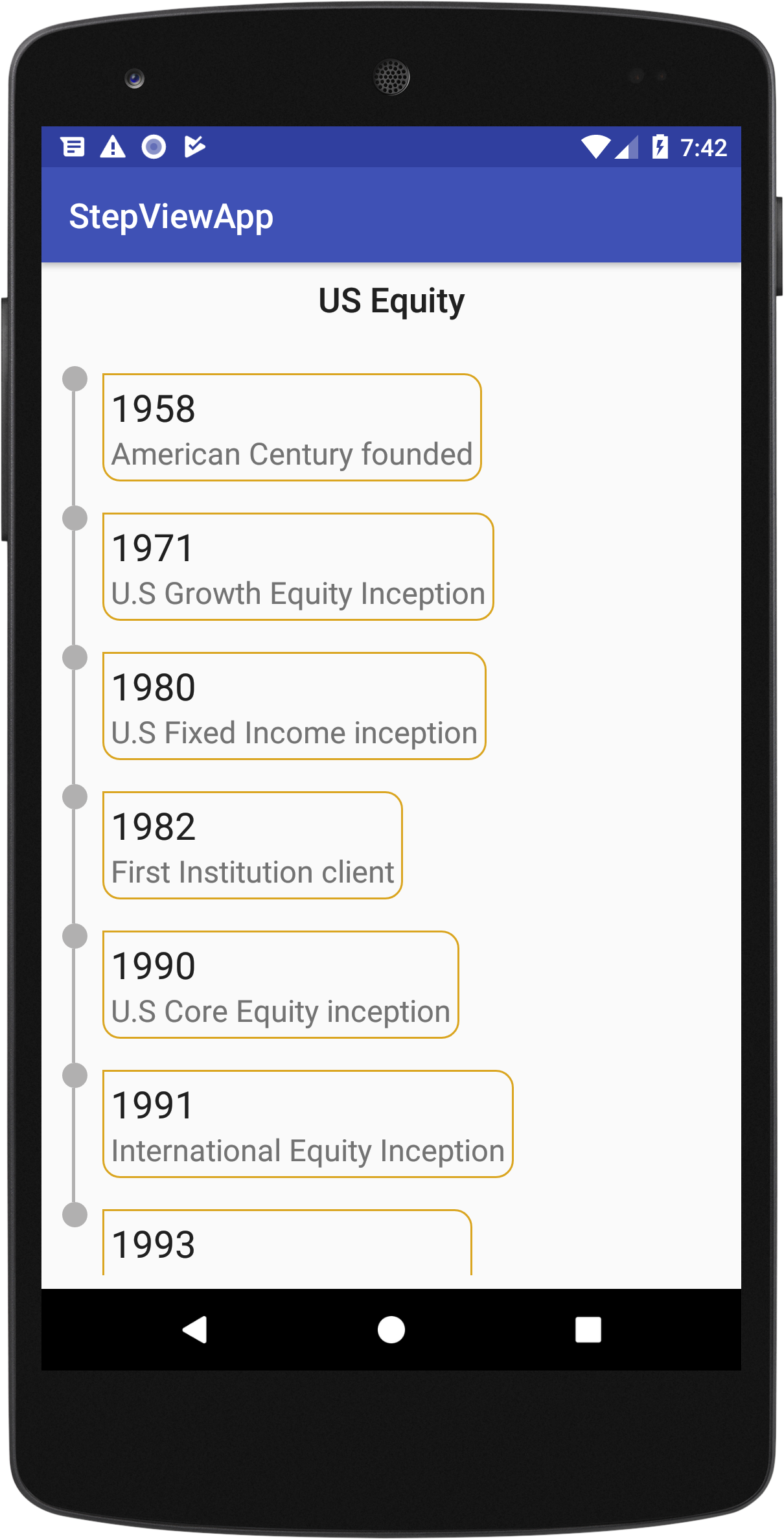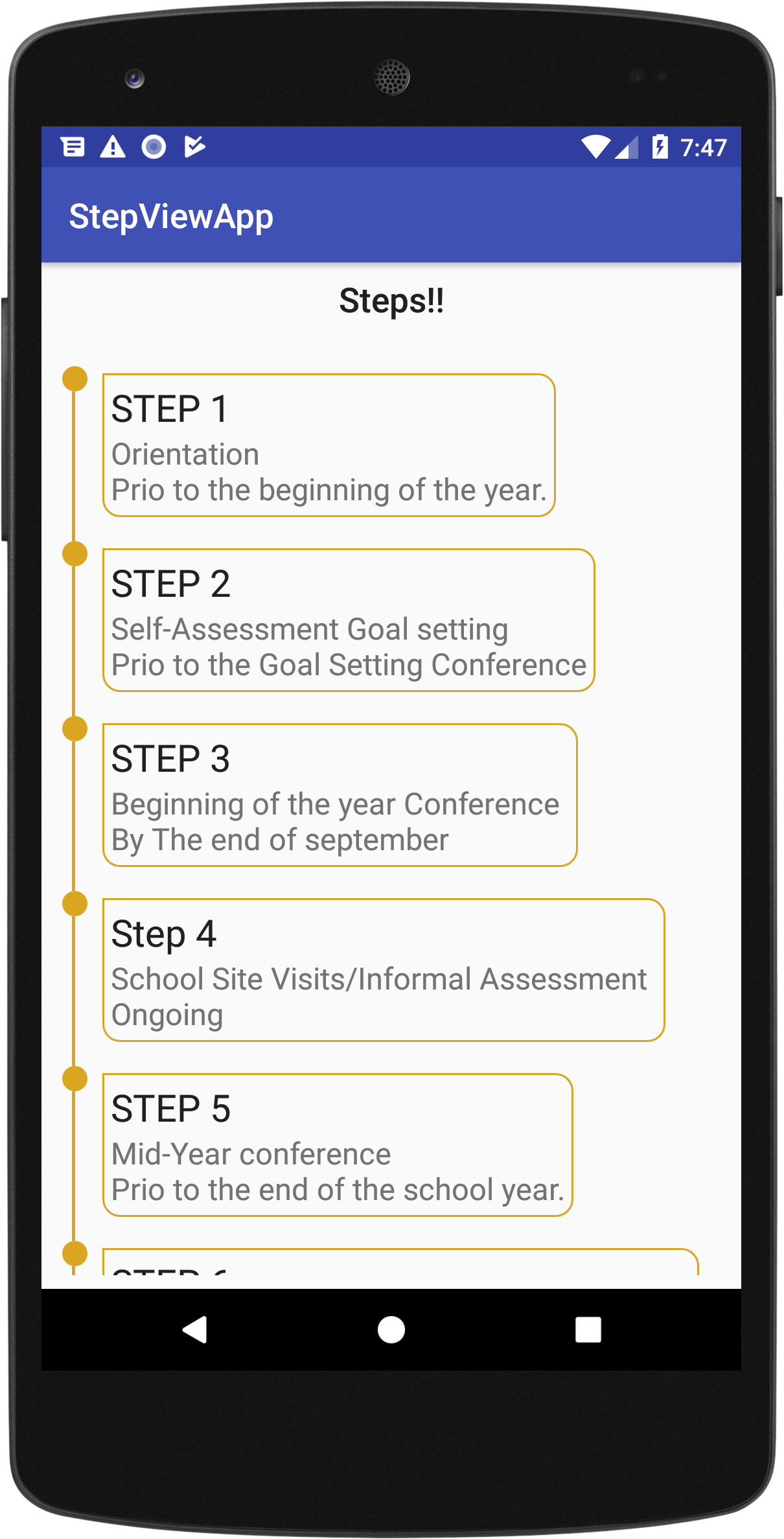Android Timeline View Library demonstrate the the power of ConstraintnLayout and RecyclerView.
Using Gradle
TimelineView is currently available in on Jitpack so add the following line before every other thing if you have not done that already.
allprojects {
repositories {
...
maven { url 'https://jitpack.io' }
}
}Then add the following line
dependencies {
compile 'com.github.po10cio:TimeLineView:1.0.1'
}Using Maven
Also add the following lines before adding the maven dependency
<repositories>
<repository>
<id>jitpack.io</id>
<url>https://jitpack.io</url>
</repository>
</repositories>
Then add the dependency
<dependency>
<groupId>com.github.po10cio</groupId>
<artifactId>TimeLineView</artifactId>
<version>1.0.1</version>
</dependency>
In your XML layout include the TimelineView as follows:
<me.jerryhanks.stepview.TimeLineView
android:id="@+id/timelineView"
android:layout_width="match_parent"
android:layout_height="match_parent"
android:layout_marginBottom="8dp"
android:layout_marginLeft="8dp"
android:layout_marginRight="8dp"
android:layout_marginTop="16dp">
Then in your Kotlin code, do the following:
Create a class that extends TimeLine
class MyTimeLine(status: Status, var title: String?, var content: String?) : TimeLine(status) {
override fun equals(other: Any?): Boolean {
if (this === other) return true
if (javaClass != other?.javaClass) return false
other as MyTimeLine
if (title != other.title) return false
if (content != other.content) return false
return true
}
override fun hashCode(): Int {
var result = if (title != null) title!!.hashCode() else 0
result = 31 * result + if (content != null) content!!.hashCode() else 0
return result
}
override fun toString(): String {
return "MyTimeLine{" +
"title='" + title + '\'' +
", content='" + content + '\'' +
'}'
}
}TimeLine has three Statuses:
- Status.COMPLETED
- Status.UN_COMPLETED
- Status.ATTENTION
You can choose from any of the statuses depending on the status of the item you want to represent.
Create an Array of your TimeLine
val timeLines = mutableListOf<MyTimeLine>()
.apply {
add(MyTimeLine(Status.COMPLETED, getString(R.string.s_title_1), getString(R.string.s_content_1)))
add(MyTimeLine(Status.COMPLETED, getString(R.string.s_title_2), getString(R.string.s_content_2)))
add(MyTimeLine(Status.COMPLETED, getString(R.string.s_title_3), getString(R.string.s_content_3)))
add(MyTimeLine(Status.COMPLETED, getString(R.string.s_title_4), getString(R.string.s_content_4)))
add(MyTimeLine(Status.COMPLETED, getString(R.string.s_title_5), getString(R.string.s_content_5)))
add(MyTimeLine(Status.COMPLETED, getString(R.string.s_title_6), getString(R.string.s_content_6)))
add(MyTimeLine(Status.COMPLETED, getString(R.string.s_title_7), getString(R.string.s_content_7)))
}Create the IndicatorAdapter and add it to the TimeLineView
val adapter = IndicatorAdapter(mutableListOf(), this, object : TimeLineViewCallback<MyTimeLine> {
override fun onBindView(model: MyTimeLine, container: FrameLayout, position: Int): View {
val view = layoutInflater
.inflate(R.layout.sample_time_line,
container, false)
(view.findViewById<TextView>(R.id.tv_title)).text = model.title
(view.findViewById<TextView>(R.id.tv_content)).text = model.content
return view
}
})
timelineView.setIndicatorAdapter(adapter)
adapter.swapItems(timeLines)IndicatorAdapter This extends RecyclerView.Adapter and exposes the following functions:
- Swaps the old items with the new items
fun swapItems(timeLines: List<T>)- Update a single item given the index
fun updateItem(timeline: T, position: Int) - Adds a list of items to the list
fun addItems(vararg items: T)See the changelog file.
TimeLineView is distributed under the MIT license. See LICENSE for details.




